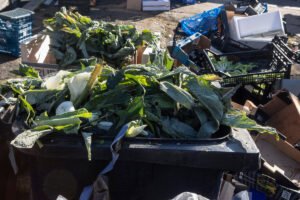Tuesday, 17 February 2026
Towards net zero: Lonza’s bold vision for sustainable nutraceuticals
Sofia Sotiropoulou, Senior Director of Sustainability and Climate Innovation within Global Procurement at Lonza CHI As sustainability becomes a top priority in the food and nutraceutical industries, companies are re-evaluating…

Sofia Sotiropoulou, Senior Director of Sustainability and Climate Innovation within Global Procurement at Lonza CHI
As sustainability becomes a top priority in the food and nutraceutical industries, companies are re-evaluating their operations, supply chains, and product development strategies to minimise their environmental impact while meeting increasing regulatory and consumer expectations. Leading this transformation is Lonza Capsules & Health Ingredients (Lonza CHI), which has recently launched its Centre of Applied Sustainability. This bold initiative aims to accelerate progress toward achieving net-zero emissions and creating more sustainable value chains for customers worldwide.
In this exclusive interview with NUFFOOD Spectrum, Sofia Sotiropoulou, Senior Director of Sustainability and Climate Innovation within Global Procurement at Lonza CHI, shares insights about the Centre’s mission, the role of carbon footprint assessments, and how Lonza is incorporating sustainability into the early stages of product development. She discusses strategies for reducing Scope 3 emissions and reimagining capsule manufacturing, offering valuable perspectives on how Lonza CHI is driving innovation that benefits both business and the planet.
What inspired the creation of the Centre of Applied Sustainability, and what are its primary objectives?
The new Centre of Applied Sustainability was established to accelerate our sustainability efforts, a critical step in our commitment to reduce environmental impact, drive greater product transparency and foster a greener future for the nutraceutical industry.
Bringing together a group of dedicated experts in operations, energy management, emissions reduction, and life cycle impact assessment, the Centre will continually evaluate and address sustainability across our operations. The Centre will also drive low-carbon innovations and identify opportunities to enhance climate resilience, aiming to achieve the lowest possible environmental impacts for Lonza CHI and its product portfolio.
As part of our dedication to helping our customers stay one step ahead, we work to support them in achieving their sustainability goals when using our products and services. Here, the Centre will offer end-to-end support, providing guidance on integrating sustainability into operations and supply chain management.
How does the Centre align with Lonza CHI’s broader sustainability strategy and its science-based emissions reduction targets?
At Lonza CHI, we view sustainability as an operating philosophy, prioritising sustainable practices not just to minimise environmental impact, but to spur innovation and strengthen our competitive edge. The newly established Centre of Applied Sustainability will steer initiatives to achieve and enhance sustainable operations, both within our product development and across the supply chain.
Some of the key priorities include energy efficiency, waste reduction and resource optimisation. For example, we aim to use 100 per cent renewable energy across our manufacturing sites. We recently achieved a key milestone in this mission when our site in Colmar, France, officially transitioned its electricity to be 100 per cent renewable. So now Lonza CHI’s sites are powered by 100 per cent renewable electricity.
We have the ambition to achieve net-zero CO2 emissions by 2050. The Centre of Applied Sustainability will both implement and innovate low-carbon solutions to reduce our carbon footprint, in line with our near-term science-based emissions reduction targets, validated by the Science Based Targets Initiative (SBTi). Additionally, the Centre will work to drive engagement, transparency and data sharing with suppliers, enabling collaboration towards a greener future for the nutraceutical industry.
Can you share specific ways in which the Centre will support customers in reducing their environmental footprint, from supply chain emissions to final products?
The Centre will offer comprehensive assistance to help customers assess their current emissions, identify reduction opportunities and adopt sustainable practices. By offering Lifecycle Assessments for all our products, as well as the expertise and best-in-class tools for sustainability analyses, we provide a comprehensive view of the environmental impact of operations and supply. With this information, the experts from The Centre of Applied Sustainability will help our clients identify opportunities, develop practical strategies, and implement initiatives to advance their sustainability journeys.
Moreover, we aim to help our customers identify ways their products can become more sustainable, so that they can provide meaningful benefits to their downstream value chains and comply with upcoming regulations. Transparency, ethical and responsible sourcing, and reduction of resource use—balanced with improving quality and performance—are some of the sustainability aspects that we are working on.
Carbon footprint assessments are a core service of the Centre—how will these assessments help customers meet their sustainability goals?
For our customers, one of the biggest challenges in reaching their climate ambitions is addressing their Scope 3 requirements, related to the emissions of their suppliers. So as suppliers, we are a part of our customers’ Scope 3 emissions. Reducing Scope 3 emissions, along the value chain from suppliers to customers, starts with reliable data and the ability to measure, track, and share environmental impact information.
Our carbon footprint assessments are designed to do exactly that—help customers better evaluate the emissions of the products they purchase from us and help them identify reduction opportunities. At the same time, this data also provides us with the same information so we can continue to improve on the environmental footprint of our products. This is one of the ways we are working towards transparency throughout the value chain.
Sustainability and innovation often go hand in hand. How is Lonza CHI integrating sustainability into the early stages of product development to create low-impact solutions?
In all our product innovations, we aim to achieve the lowest possible environmental footprint across their lifecycle. As part of this strategy, we have implemented ‘sustainability by design’ standards for energy and water efficiency, which enables us to build growth projects with best-in-class sustainable technologies.
We are actively investing in and evolving our processes so that our next-generation capsule manufacturing technology will significantly reduce our net carbon footprint, whilst increasing productivity and setting a new quality standard. Demonstrating that industry-leading standards can be delivered while making a positive impact on the environment.
For example, at our site in Bornem, Belgium, we have established a process to re-use 100% of our waste gelatin—both through upcycling gelatin by-products from our manufacturing process in subsequent capsule production, and repurposing any by-products that cannot be re-used for the production of biogas.
Looking ahead, what are the key milestones or future initiatives planned for the Centre of Applied Sustainability?
The Centre of Applied Sustainability will be a major driver towards the collective environmental goals of Lonza CHI, our partners, suppliers, and customers. Key goals on the journey to achieve net-zero by 2050 or earlier include a 42 per cent reduction in Scope 1 and 2 emissions and a 50 per cent reduction in greenhouse gas intensity by 2030. Additionally, the Centre will be working with our suppliers with the goal that, by 2030, 90 per cent of the spending will be covered by sustainability assessments and at least 67 per cent of Scope 3 suppliers will have science-based targets.
Shraddha Warde
shraddha.warde@mmactiv.com
Technology
Carlsberg Launches AI-Crafted Lunar New Year Packaging
Feb 17, 2026 | Beverages
FAO Experts Assess Risk of Antimicrobial Resistance Spreading via Food Loss and Waste
Feb 17, 2026 | Sustainability
Setting the Standard for Sustainable Ingredients
Feb 16, 2026 | Ingredients
Food Testing
Redefining Trust in Organic Foods through Independent Testing
Feb 13, 2026 | Food Safety and Testing
AFNOR International Eyes Global Food Safety Growth with HACCP Group Takeover
Feb 04, 2026 | Australia
More Popular
Cerealto Sells Pasta Unit to Specialist Player Cerealis
Feb 17, 2026 | Company News
New Nestlé Vital nutritional drink targets rising demand for healthy-ageing solutions
Feb 17, 2026 | Company News
Carlsberg Launches AI-Crafted Lunar New Year Packaging
Feb 17, 2026 | Beverages






